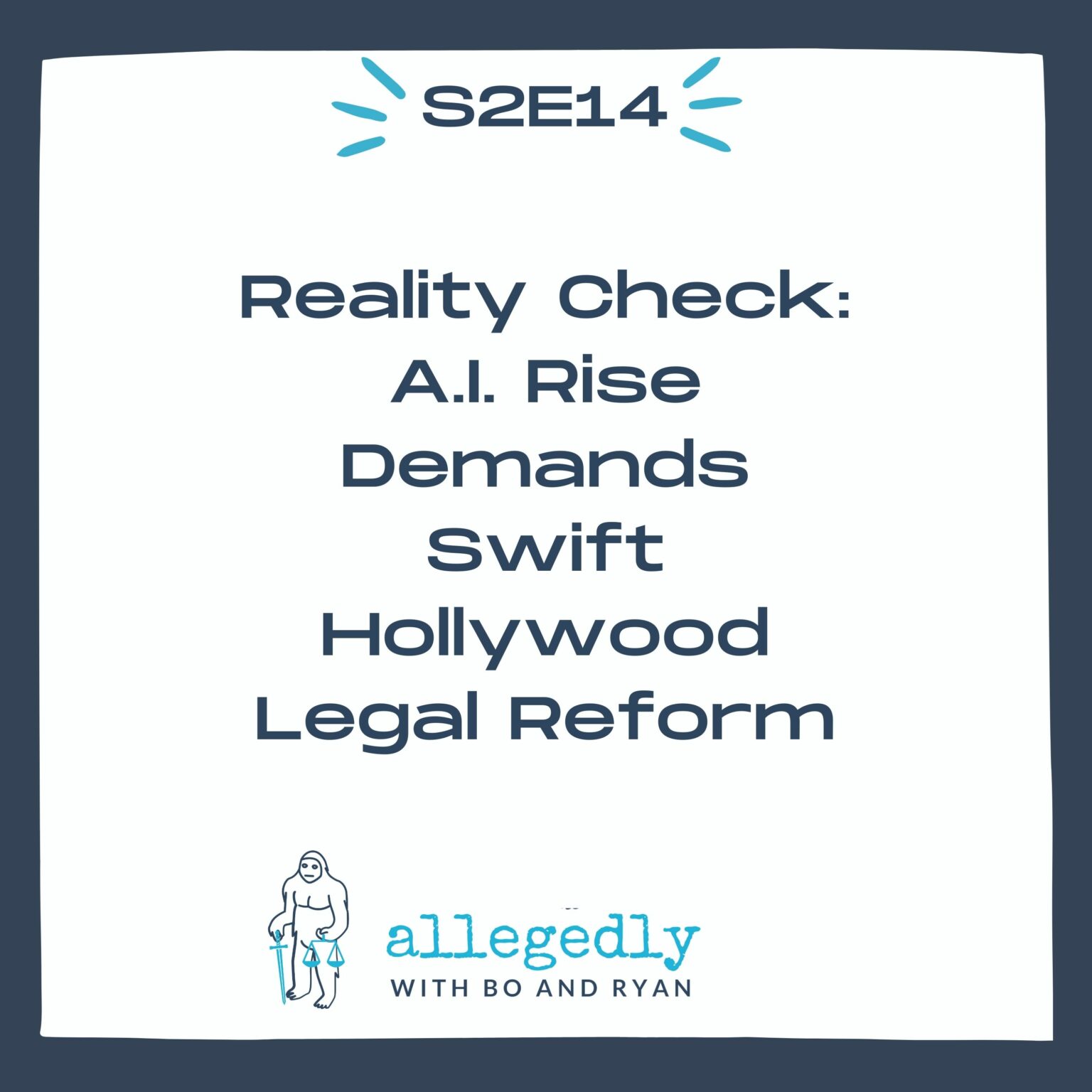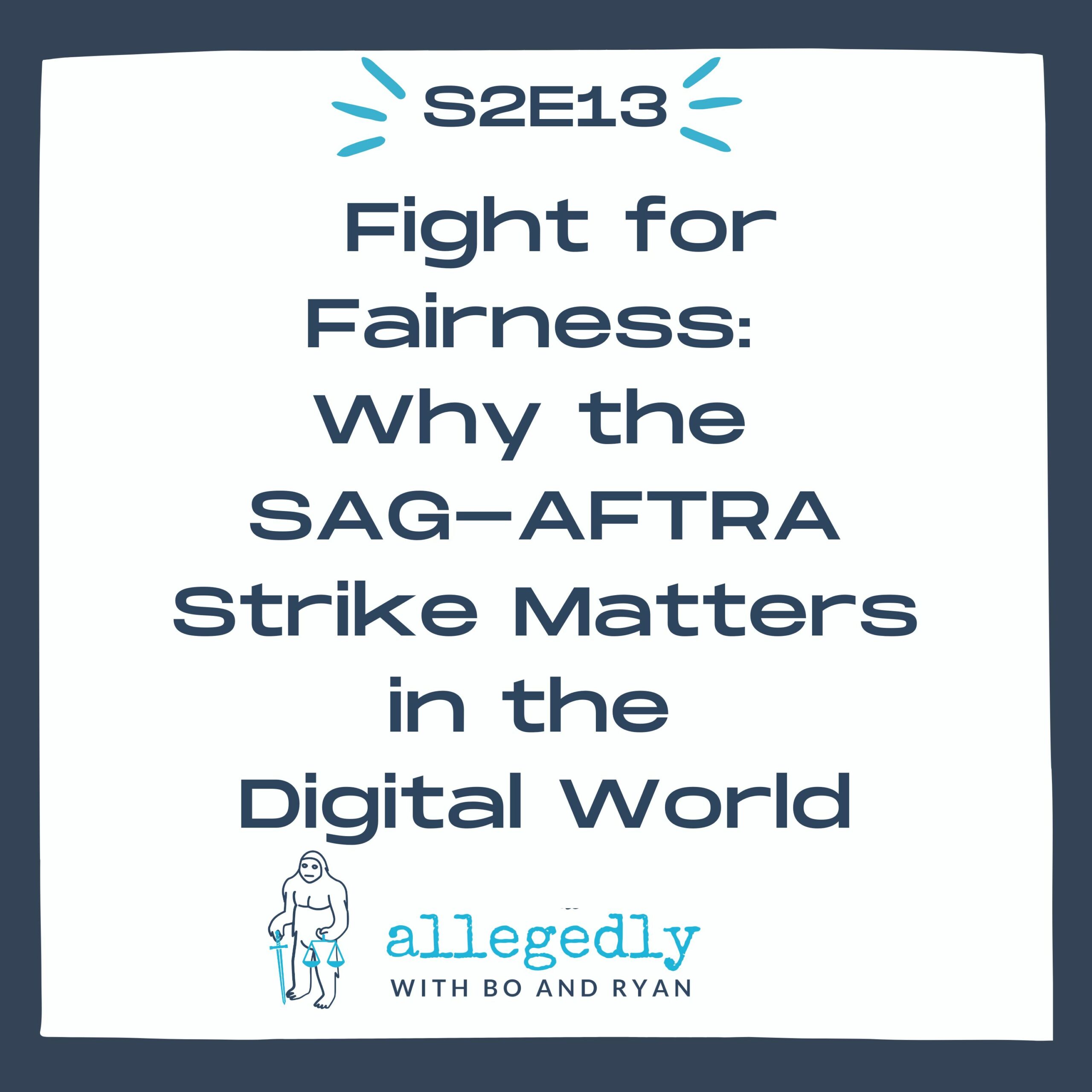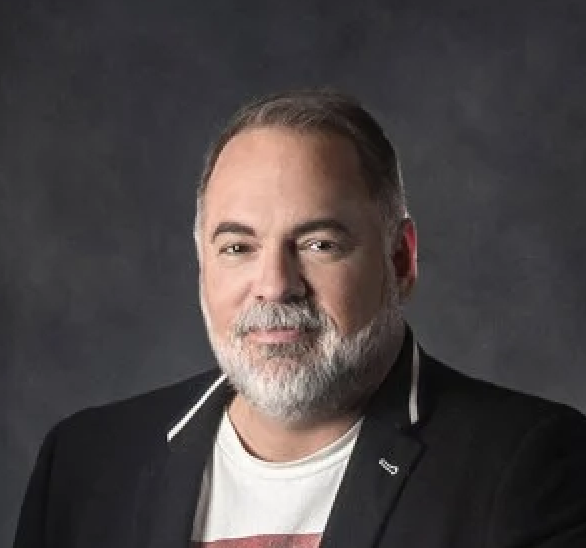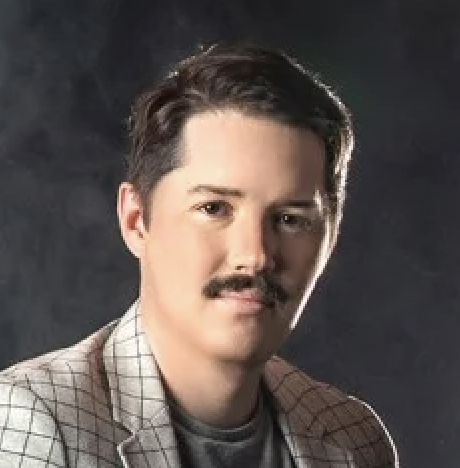allegedly with Bo and Ryan | Episode 1
Today on the podcast, Bo and Ryan examine common myths about the practice of law that film and TV consistently get wrong. …allegedly.
Allegedly… with Bo and Ryan Podcast E1 | Transcript
Bo: [00:00:00] It does bring one to mind to me that drives me nuts when I see it in a movie. And that’s when you’ve got someone standing up to give their closing argument — and they make that argument where they say, Ladies and gentlemen of the jury. What would you have done? What if this had been you? You know, it’s called. You just can’t do that. It’s literally called the Golden Rule.
Ryan: [00:00:26] Welcome to allegedly with Bo and Ryan, the only Entertainment and Lore podcast that brings you the truth, the whole truth, and nothing but the truth. Allegedly.
Bo: [00:00:37] I’m Bo Bowen.
Ryan: [00:00:38] And I’m Ryan Schmidt.
Bo: [00:00:39] You’re listening to Allegedly with Bo and Ryan. We’re coming to you from our law offices in beautiful historic Savannah, Georgia, where we’ll be chatting about pop culture, hot legal topics in the news, and doing our best to change the way people think about the law and lawyers. The first, a little about us.
Ryan: [00:00:58] Bo knows the definition of every single word in Black’s law dictionary, even the Latin-y ones.
Bo: [00:01:04] And Ryan knows the lyrics to every single song that ever has or ever will be written.
Ryan: [00:01:12] Together, we are Savannah’s consummate renegade legal titans.
Bo: [00:01:16] And the only corporate and entertainment lawyers in the entire free world who have never lost a single case, allegedly.
Ryan: [00:01:28] Hey, Bo, how are you doing?
Bo: [00:01:29] I’m doing great, Ryan.
Ryan: [00:01:31] Well, I’m so excited to be finally recording this podcast with you. I mean, how long have you been trying to do this?
Bo: [00:01:37] A very long time. Probably two and a half years, although it seems more like ten.
Ryan: [00:01:44] Well, I was thinking the best way to kick off and introduce people to what we’re doing is really talk about the myths that many movies and TV shows get wrong about lawyers.
Bo: [00:01:55] Oh man, it is hard to watch legal shows, that is for sure.
Ryan: [00:02:00] I mean, I watch these shows and even before becoming a lawyer and I thought, do real lawyers actually do this?
Bo: [00:02:07] Well, let’s talk about it. What’s — what’s an example of something you could think of?
Ryan: [00:02:11] Well, for me, one of the things that always happens in movies is there’s this big moment. It’s there’s just a surprise. It’s the witness. It’s the evidence, the smoking gun, the confession that you never even see coming. And boom, it blows the whole case open.
Bo: [00:02:27] I know exactly what you’re talking about. You’re talking about that moment where suddenly everyone in the courtroom turns to look at the courtroom door.
Ryan: [00:02:36] Exactly like it’s the state calls James Dokes and somebody in a southern accent goes, But I thought Dokes was dead.
Bo: [00:02:45] I know exactly what you mean. The surprise witness.
Ryan: [00:02:50] So. So when I was thinking about the surprise witness today for this episode, one of the movies that I couldn’t help but think about was one of my favorite legal movies was My Cousin Vinny. Of course, in My Cousin Vinny. There’s two New Yorkers that are accused of murder in a small rural town that they’re driving through. A store clerk gets shot in a convenience store, and the small town thinks it’s these two outsiders. They end up hiring one of the accused, Cousin Vinny, who had taken the bar exam about five times, and he finally passes. And he’s he’s way out of his element. But finally he puts his girlfriend on the stand. And this is Mona Lisa, played by Marisa Tomei, and she’s grown up and her dad’s mechanic store. And she she knows everything there is about cars. And she’s looking at this photograph of of the crime scene and she sees these tire marks. And the prosecutor is cross-examining her and saying, you know, so with your experience of this car, is it reasonably likely that it’s it’s these accused And she looks at the photograph and she says, no. And the prosecutor is very confused. He says, Why? Why? Why is that true? She goes on this big long rant about Paul’s attraction and and there was actually this stability shock system put in this that certain model of GMC that their car wouldn’t have. So it wouldn’t actually make those clean tire marks. It’d be more up on the sidewall. So they get off because of the tread pattern. And it’s also an example of the surprise expert witness. If you if you want to call Mona Lisa an expert.
Bo: [00:04:36] Well, yes, That film famously filmed in Monticello, Georgia, really one of the movies that kicked off the explosion of filming in Georgia. So, yeah, I have a soft place in my heart for that one. But I can tell you another example where there are surprise witnesses, surprise documents, surprise everything, the television show suits. Have you ever seen that, Ryan? Oh, of course. And do you know which episode that happens in everyone? Exactly. So, yeah, that’s. That just it just simply doesn’t happen.
Ryan: [00:05:15] Yeah, it doesn’t happen because in real life we’ve got what is called discovery, whether it’s in a criminal case or in a civil case, there is a procedure in which both sides get to exchange the information that they plan on giving at trial. And the scope of discovery is actually very broad. It’s not just what is going to be admissible at trial. It’s any type of evidence that may reasonably lead to admissible evidence. So you get to see a lot of the other person’s best evidence and their arguments before you ever step foot in the court. And not not to mention that. But if you try to spring something that the judge had never seen or never heard of, you’re really going to piss him off.
Bo: [00:05:55] Yeah, I mean, the whole idea behind a jury trial is there are no surprises. I mean, Discovery is intended to make certain, you know, every single bit of evidence the other side has. So the surprise witness, the surprise evidence, that’s not real life.
Ryan: [00:06:13] Now, that being said, I mean, certainly there’s times where evidence or witnesses can be used and can be proper. For example, there’s a rebuttal witness say somebody says something and the other side brings in a witness to counter that testimony. That’s that’s a time when you didn’t know whether or not you’re going to propound that evidence. But given that you need to shore up your case in rebut testimony of somebody else, you bring them in. And a perfect example of this was recently in the Johnny Depp Amber Heard trial, where the owner of a luxury trailer park was called by Depp’s legal team to rebut Amber Heard’s testimony that Depp was belligerent at a campground at this luxury desert trailer park, and he threatened to break the wrist of one of Amber Heard’s female friends. The person who came out, the owner of this trailer park said he was completely present and didn’t see any signs of belligerence or were threatening and menacing. So, I mean, that’s that’s an example of when you can bring them in.
Bo: [00:07:16] Well, that is true in theory. I agree with you. The problem is not everyone is Johnny Depp. So in other words, let’s say I’m trying a case and a witness testifies, Oh, well, you know, this mechanic in Australia, you know, he told me something completely different and I may want to say, Oh, yeah, well, I’ll bring him in and we’ll ask him. But guess what? I don’t have the resources, nor does my client to fly someone via private jet overnight to rebut that testimony. So in reality, even rebuttal witnesses or evidence are extremely rare. It just it just really doesn’t happen.
Ryan: [00:08:00] I just you just made me think of one small way that you could democratize Paying for that private jet flight in today’s legal environment is maybe just convincing the judge, Can we do a Zoom hearing?
Bo: [00:08:14] Eh eh– You got a point. Now, thinking about surprise witnesses, it does remind me of something there. I actually have seen a fair amount of surprise evidence and testimony. But the interesting thing about it is it really has nothing to do with someone being a great lawyer. It really has a lot more to do with the other side being terrible. Give me a perfect example. So quite a few years ago, Miss Savannah, the reigning Miss Savannah, was accused of murder. It was. It was in all the papers here. And a good friend of mine, Mike Schiavone, was defending her, along with my partner at the time, Brian Daly. He was assisting him. And the district attorney’s office had given them a huge stack about two feet high of the victim’s medical records from the hospital because Miss Savannah had shot him and he ultimately died several hours later. Jeez. So. Mike Giovani got up to give his closing or his opening statement and he says to the jury, and you’re going to find out today that that victim, this supposed sweet, you know, innocent victim, was actually high as a kite at the time he was shot. And the district attorney jumped up and said, objection, Your Honor. There is no evidence of that whatsoever. Mike just calmly looked and said, well, actually, it’s on page 973 of the stack of documents you gave me.
Ryan: [00:09:51] Ouch.
Bo: [00:09:52] So there can be surprise witnesses if you’re not fully inadequately prepared for trial. So that’s an example where there is a surprise. But, you know, not really anyone’s fault but the person who was surprised.
Ryan: [00:10:08] It also goes to the point, maybe before you hand something over to the other side, maybe you check through it, understand it, read it, maybe another thing along that lines I think is often used is the surprise confession on the stand that I mean, this never happens for the same reasons we were just talking about. You’ve got discovery, you’ve got chances where you can depose these people and cross-examine them beforehand. And yeah, you can if they change their story up, you can impeach them. But rarely is somebody who’s going to break under the pressure and then admit to murdering their stepmother or something like that. So, you know, Legally Blonde comes to mind with the infamous scene where the the witness who’s the daughter of the the victim of this murder, says that she got her hair permed and then then immediately took shower. And because Elle Woods, you know, grew up in in West Hollywood and knows all about beauty and everything, it wasn’t her legal training. It was her it was her cosmetology training that said, actually, you know, any any person that gets a perm should know you can’t wet your hair for 24 hours. So this this girl found herself in a lie and she said, okay, I did it. And she completely confessed to this thing. Yeah, that’s not going to happen. You know, the other thing, of course, is a few good men and you can’t handle the truth. And of course I did it and all that, you know.
Bo: [00:11:35] Yeah, that’s that’s not real realistic. And but, you know, calling upon my many, many years of legal experience and training, I can tell you a very good reason why there is so seldom major confessions at trial.
Ryan: [00:11:54] Why is that?
Bo: [00:11:54] Because people lie. Hey, did you kill that guy? No, I didn’t.
Ryan: [00:12:04] Fair enough.
Bo: [00:12:06] Well, you know that kind of talking about. People confessing at trial and staying saying things. It does bring one to mind to me that drives me nuts when I see it in a movie. And that’s when you’ve got someone standing up to give their closing argument. And they make that argument where they say, Ladies and gentlemen of the jury. What would you have done? What if this had been you? You know, it’s called. You just can’t do that. It’s literally called the Golden Rule. You cannot ever put the jury in the place of one of the parties. And you know why you can’t do that, Ryan? Why is that? Because it’s so damn effective to do that. Sure. It’s an incredibly powerful argument, so much so that it’s actually a rule that you cannot do it ever. Yet you see it all the time.
Ryan: [00:13:04] Yeah, that’s a good point. I was. That made me think about the Matt Damon flick, The Rainmaker, where you got this young lost this young lawyer right out of law school, and he’s taking on the big corporate money and the big insurance company. In his closing argument, he actually says, do what you think is right in your hearts. And if you don’t punish that insurance company over there, you could be their next victim.
Bo: [00:13:32] Yeah.
Ryan: [00:13:33] But in real life, that’s a mistrial. And that attorney is getting sanctioned.
Bo: [00:13:37] Absolutely. Well, what’s another example? What else can you think of?
Ryan: [00:13:42] Oh, man, that lawyers. I mean, every single legal, procedural or even kind of legal comedy, whatever you see, lawyers are always in courtrooms. There’s no such thing as a tax attorney. There’s no such thing as like a transactional attorney. No, They’re just always in the courtroom. You know, I think about Suits and Ally McBeal and LA Law and the Practice and everything that they handle a new trial every single week.
Bo: [00:14:08] Oh, man. Yeah. Trials are hard. I love those. Those shows where they’re like, All right, I need somebody to handle the Johnson trial at 2:00 today. And the next scene, they’re in the courtroom trying the case. Yeah, it’s trials actually are, you know, they’re fairly rare. I mean, you’re not in trial every day, even. It’s litigation attorneys like we are. You know, if we can, we try to avoid trials. They’re unpredictable. They’re stressful. They you know, you never know what’s going to happen. But, you know, even when we do go to trial, it’s after definitely months and sometimes years of preparation to get there. Not Hey, Ryan, got to trial tomorrow. Here’s the file.
Ryan: [00:14:53] Yeah, I would not appreciate that. But that goes into I mean, especially in today’s age with with COVID, you know, the courts were shut down for a year and a half with COVID just cases just completely put the pause button on all cases that were going on. So I often hear negotiation tactics, people saying, well, you know, good luck waiting around for a trial date on this one.
Bo: [00:15:16] Yeah, exactly. Yeah. It’s a it is a major problem. But, you know, thinking about those same kind of shows, you know, they also do something else in addition to like the everybody going to trial immediately. Every lawyer, if you notice, every single lawyer acts the exact same way. They’re always like hyper aggressive, you know, just super vigilant and like, like, you know, ready to just like, have a sarcastic comment thrown out at the judge or the jury and ready to take a swing at the other side. I mean, I guess it makes good TV in movies, but it will also get you in a lot of trouble as a lawyer and not be very effective. I can think of a movie from back when I was in college. I’m sure you may never even heard of it. It’s called From the Hip.
Ryan: [00:16:04] No, I haven’t seen that one.
Bo: [00:16:05] It’s it stars Judd Nelson as a lawyer named and this is not a joke.
Ryan: [00:16:10] Stormy Weathers thought you’re going to say Stormy Daniels.
Bo: [00:16:16] Yeah, well, you see, it’s all the time. I mean, it has a perfect example in this movie. It’s like this Stormy is in court and he has this major battle in every single thing is yelling back and forth and the judge is banging his gavel. Order, order, order! And then it’s so bad that when they see each other at like a cocktail party that night, they literally get into a fistfight and both fall into the swimming pool, you know, another day at the office. Right. So, I mean, I mean, every show you see like that, the lawyers are talking over each other. They’re yelling at each other, even the judge to the point of, like being held in contempt, you know.
Ryan: [00:17:01] Oh, man. The contempt trope. Yeah. I mean, every lawyer is is so aggressive, thinks nothing about yelling at the other side or at the, God forbid, the court in any type of argument. I was thinking about the show, the practice, you know, the show, the practice, of course. And here. There’s there’s one episode that I remember where Eugene is doing a criminal appeal, and he’s he’s arguing in front of an on bonk panel and they deny his appeal and they they uphold the lower court’s criminal conviction. And the judges are all walking off. And, you know, they say, and that’s our ruling. And they do the little dramatic gavel thing, which also doesn’t really happen. But they’re walking off and Eugene says permission to to speak to the court, you know, to address the court. And if I was a judge, I’d say you already did. You know you lost. But he goes into this big impassioned speech and, you know, you know, he just goes into all these big issues and, you know, public policy and this isn’t right. And the judges, each one of them, because it’s a three panel panel, a three judge panel, they’re all saying, you know, you’re going to be held in contempt. You say one more word, you say one more. And he even says to them, I’ll find the three of you in contempt, which makes no sense.
Bo: [00:18:25] Well, I have to say this is a true fact. Almost 30 years in courtrooms, I have never once seen a lawyer held in contempt. Not a single time. I mean, I’m sure it happens, but it’s extremely rare. You would have to be so over the top, so disrespectful, so unprofessional to actually be held in contempt. I mean, it just doesn’t happen. But I will tell you a little dirty secret. I think every lawyer at some point in their career kind of wants to be held in contempt. I mean, it actually sounds kind of cool. Plus, it would be like all the other lawyers would be telling these legendary stories about you.
Ryan: [00:19:09] Like the one time.
Bo: [00:19:10] That Bowe did this. Oh, my God. Did you? Yeah. The judge threw him right in jail. It was amazing, you know? You know what? I take it all back. You know, that’s your new assignment, right? Get held in contempt. That sounds pretty awesome.
Ryan: [00:19:24] Wow.The other one that I think about was just these — these lawyers being so aggressive, overly aggressive is this idea of permission to treat the witness as hostile. You know, and that’s that’s something that so rarely happens. Of course, if you’re putting on your own witness, that’s going to be a witness that is helpful to your case. Most likely the only time you’re ever really going to get that is if you want to put on a witness that the other side refuses to call that is actually adversarial to you. But saying, can I can I treat this? Those witnesses hostile is really goes to the point of your ability to cross examine the witness, not to just, you know, take the gloves off. And one of the things I think about is the The Dark Knight movie, where Harvey Dent as the district attorney requests permission permission and then immediately goes over to the witness and punches him right in the face. The witness who’s like in the mob, pulls out a gun. He’s like, Hey, you know, didn’t think about this, did you? And all hell breaks loose. But, you know, in reality, this is a criminal accused you. He already would have had the right to cross-examine him so he could have treated him as an adversary. And in this case, his his client was the city government of Gotham. So he wouldn’t have had to go through all that anyway.
Bo: [00:20:47] Yeah, but could he have punched him in the face? That’s the real question.
Ryan: [00:20:51] I mean, and then he. Then he could spend the night in jail.
Bo: [00:20:55] Well, again, legendary status.
Ryan: [00:20:59] But we know how Harvey Dent story ends and the to face and all that.
Bo: [00:21:03] All right, that’s fair. Well, well, let’s do one more. What are they? You got? You got another one? Something you hate the way lawyers are portrayed.
Ryan: [00:21:10] Yes, I can think of one more. At least it’s the idea that lawyers practice and know every single possible area of law. All at once. The omni disciplinary lawyer.
Bo: [00:21:24] Wait, the what? The omni disciplinary lawyer?
Ryan: [00:21:27] Yes. All encompassing.
Bo: [00:21:30] I like it.
Ryan: [00:21:30] Yeah. I mean, so.
Bo: [00:21:32] Did you just make up that word?
Ryan: [00:21:33] I’m pretty sure I did. It was on my word all today. Nice. So. So the lawyers that come to mind here is suits. Of course, we talk about that a lot. But Harvey Specter, he is the jack of all trades. He he started off in the DA’s office. He can do criminal prosecution. He did a divorce for Lewis’s sister. He does mergers and acquisitions. He does criminal defense, commercial real estate and all while having, you know, millions of dollars and wooing beautiful women.
Bo: [00:22:04] Yeah, that’s true. Reminds me another one of my favorite fictional lawyers, Alan Shore on Boston Legal. Oh, of course. By the way, I will warn anyone listening to us show does not age. Well.
Ryan: [00:22:19] Why would you say that, Bo?
Bo: [00:22:23] Well. That having been said, Denny Crane and Alan Shore are hilarious, but same thing. They’re brilliant. Alan Shearer is so brilliant that anything other than the single most complex legal case in the universe is just boring. I’m not going to deal with it. And same thing we were talking about Court. He’ll go into court. It’ll be like, Objection, Your Honor. Opposing counsel is stupid.
Ryan: [00:22:53] Not the best argument to make. Well, that reminds me of the show The Good Wife, too. I mean, that firm just does everything they do a capital murder trial. They do immigration law and copyright law. I mean, I can’t think of three more completely different things with different sets of skills.
Bo: [00:23:13] Well, you know, when you see those lawyers that literally do every single type of law, it immediately brings to mind to me when you walk into one of those restaurants that has like the, you know, 45 page menus. Oh, sure. You know, well, what do I want tonight? Burgers, pizza, Mexican food. Oh, look, sushi. Well, you know, at that moment, you ain’t getting one damn thing. That’s delicious, right?
Ryan: [00:23:44] Definitely not.
Bo: [00:23:44] It’s like pick a lane. I mean, now, that having been said. There are certainly attorneys that refer to themselves as general practitioners, and by definition, they basically will take any case that comes through the door. We all know a few lawyers like that, you know, and they’re fine. They you know, if they need to do a divorce one day and they’ve never done it, well, guess what? They’ll read up on it real quick, figure out how to do it and do it. Now, that having been said, I mean, how do I say this diplomatically, Ryan? Let’s just say that the general practitioners I know none of them have penthouse offices in Manhattan, like Harvey Specter on suits. I mean, if you want to really be successful and I think this applies to really any profession. Choose carefully, pick a field, pick an area, and then become the very best at it.
Ryan: [00:24:46] You mean kind of like how the Bow and log group focuses on the corporate and entertainment law?
Bo: [00:24:51] Exactly right. Which is why, of course, we are the most successful lawyers in the history of American jurisprudence. Allegedly.
Ryan: [00:25:03] Well, everyone, that’s our show for today. Thanks for listening to the legal mastery of the highly intelligent and easily most attractive, true legal outlaw lawyers in Savannah. And remember, the only lawyers in the free world who have never lost a single case, allegedly, to continue to receive free edge of your seat. Legal anecdotes mind blowing takes on hot legal topics in a general master class in law awesomeness. Please head over to the bow and log group slash podcast and look for dude.
Bo: [00:25:32] Just tell them yo hit the damn subscribe button.
Ryan: [00:25:37] Fair enough.














